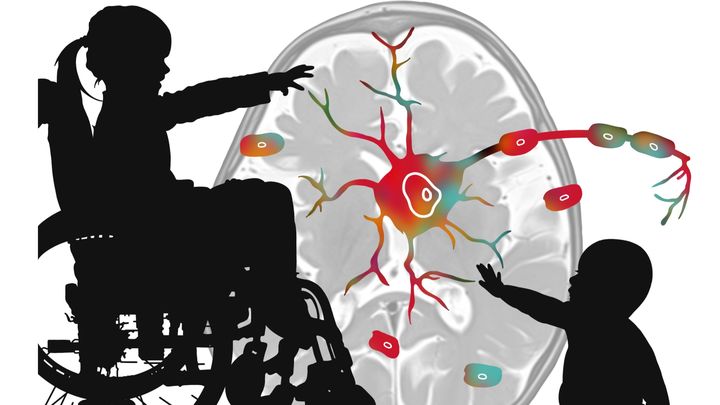
Treatment for the rare children's disease HLD18
Donation protected
English
The goal of this fundraiser initiative is to fund a novel treatment for patients with an ultra-rare and fatal brain disease, the hypomyelinating leukodystrophy-18 (HLD18), that our laboratory discovered few years ago.
- What is HLD18?
It is an ultra-rare disease that affects boys and girls from the first months of life. These children have very serious motor and cognitive problems, many of them cannot walk or have never learned to speak, some of them also have eating problems and epilepsy. Most patients die early. To date, we have identified only 33 patients in the world with this disease, 6 of whom have unfortunately already died.
- What do we want?
We have about 7 patients from all over the world (Spain, India, Egypt and the United States) who are interested in enrolling our pilot study but we cannot treat them since we cannot afford the high cost of the drug, Fingolimod (by Novartis). Currently, our pilot study is their only therapeutic option. We are treating 2 patients (a hospital and the family have covered the cost, respectively) and we have very encouraging results.
- Why can't we pay for the drug for every patient?
Fingolimod treatment costs 15,000-20,000€ per year per patient; it is a drug in the market since 2010 for the treatment of Multiple Sclerosis. Our data indicate that Fingolimod is also useful for treating patients with HLD18, but have not been able to convince the pharmaceutical companies to help us paying for the drug. To have health systems covering the drug we need to gain an Orphan Drug Designation, which comes after a bigger study with more patients is finalized (we are working on it).
- About us?
We are an academic research and diagnostic lab, the Neurometabolic Diseases Laboratory (http://www.neurometabolic-lab.org/) of IDIBELL (https://idibell.cat, Barcelona), who discovered this disease in 2019. Our research identified biomarkers able to establish a rapid diagnosis and now we wish to provide a therapeutic option completing our study, do you want to help us?
* The number of patients treated and the duration of treatment will be determined by the amount of money received.
In the following video Dra. Aurora Pujol, leader of the Neurometabolic Diseases Laboratory, explained the discovery of this new disease. It includes a video of one of the patients:
Español
El objetivo de esta iniciativa de recaudación de fondos es financiar un tratamiento novedoso para pacientes con una enfermedad cerebral ultra rara y fatal, la leucodistrofia hipomielinizante-18 (HLD18), que nuestro laboratorio descubrió hace unos años.
- ¿Qué es la HLD18?
Es una enfermedad ultra rara que afecta a niños y niñas desde los primeros meses de vida. Estos niños tienen problemas motores y cognitivos muy graves, muchos de ellos no pueden caminar o nunca han aprendido a hablar, algunos también tienen problemas de alimentación y epilepsia. La mayoría de los pacientes mueren temprano. Hasta la fecha, hemos identificado solo 33 pacientes en el mundo con esta enfermedad, 6 de los cuales lamentablemente ya fallecieron.
- ¿Qué queremos?
Tenemos alrededor de 7 pacientes de todo el mundo (España, India, Egipto y Estados Unidos) que están interesados en entrar en nuestro estudio piloto pero no podemos tratarlos ya que no podemos permitirnos el elevado precio del medicamento, el Fingolimod (de Novartis). Actualmente, nuestro estudio piloto es su única opción terapéutica. Estamos tratando a 2 pacientes (un hospital y la familia han cubierto los gastos, respectivamente) y tenemos resultados muy alentadores.
- ¿Por qué no podemos pagar el medicamento para cada paciente?
El tratamiento con Fingolimod cuesta entre 15,000 y 20,000€ al año por paciente; es un fármaco en el mercado desde 2010 para el tratamiento de la Esclerosis Múltiple. Nuestros datos indican que el Fingolimod también es útil para tratar pacientes con HLD18, pero no hemos podido convencer a las compañías farmacéuticas para que nos ayuden a pagar el medicamento. Para que los sistemas de salud cubran el medicamento, necesitamos obtener una designación de medicamento huérfano, que se puede conseguir después de que finalice un estudio más grande con más pacientes (estamos trabajando en ello).
- ¿Sobre nosotros?
Somos un laboratorio académico de investigación y diagnóstico, el Laboratorio de Enfermedades Neurometabólicas (http://www.neurometabolic-lab.org/) del IDIBELL (https://idibell.cat, Barcelona), que descubrimos esta enfermedad en 2019. Nuestra investigación identificó biomarcadores capaces de establecer un diagnóstico rápido y ahora queremos dar una opción terapéutica completando nuestro estudio, ¿quieres ayudarnos?
* El número de pacientes tratados y la duración del tratamiento estarán determinados por la cantidad de dinero recibida.
En el vídeo completo (a partir del minuto 8:03) la Dra. Aurora Pujol, líder del Laboratorio de Enfermedades Neurometabólicas, explica el proceso que realizamos para el estudio de enfermedades minoritarias: https://www.rtve.es/play/videos/el-cazador-de-cerebros/no-raro-enfermedad-rara/6531217/
References:
Pant DC, Dorboz I, Schluter A, Fourcade S, Launay N, Joya J, et al. Loss of the sphingolipid desaturase DEGS1 causes hypomyelinating leukodystrophy. J Clin Invest. 2019;129(3):1240-56.
Organizer and beneficiary
Laura Planas Serra
Organizer
Torelló
ELA-España Leucodistrofias
Beneficiary


